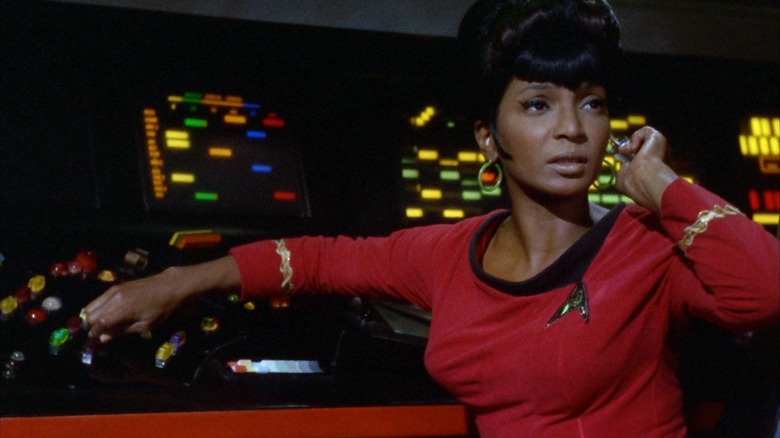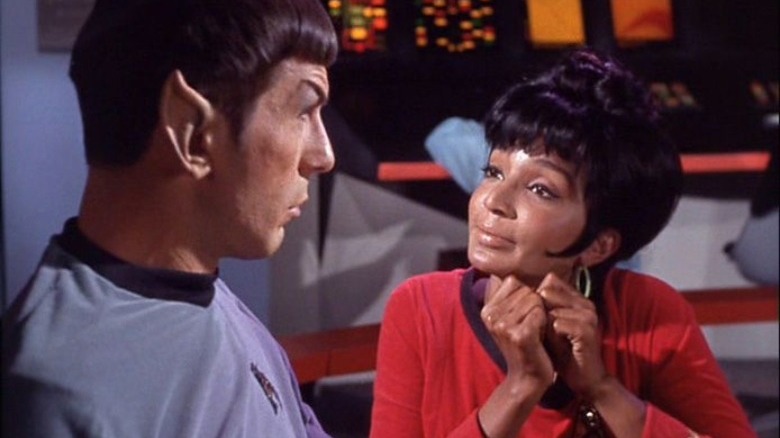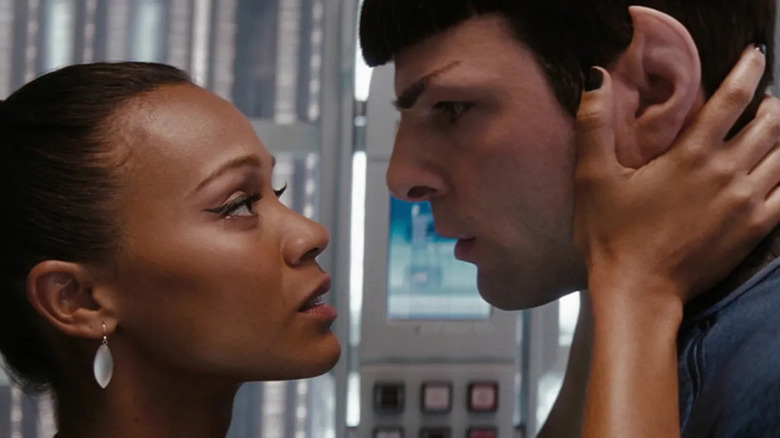Star Trek's Nichelle Nichols Saw A Plausibility Error In JJ Abrams' Franchise
Lieutenant Uhura (Nichelle Nichols), the U.S.S. Enterprise's communications officer on "Star Trek," rarely got episodes of her own. Audiences learned about Uhura through her interactions with the other members of the crew, remaining professional on the bridge, and keeping her personal life personal. It wouldn't be until the "Star Trek: The Animated Series" episode "The Lorelei Signal" (September 29, 1973) that Uhura would take command of the Enterprise and solve the crisis of the week. Uhura remained the communications officer on the Enterprise through the events of "Star Trek VI: The Undiscovered Country" in 1991. On "Star Trek: Picard," it was mentioned that Uhura had become the captain of a ship called the U.S.S. Leondegrance and made first contact with hundreds of new species.
Fun trivia: King Leondegrance was Guinivere's father in Arthurian myth. In John Boorman's 1981 Arthurian film "Excalibur," King Leondegrance was played by future "Star Trek" luminary and Picard himself, Patrick Stewart.
As far as Trekkies knew, Uhura didn't have any romances, but that's likely because she merely kept her personal life personal. This changed in 2009 when J.J. Abrams made his rebooted "Star Trek" feature film with a new cast playing the younger, sexier versions of the Enterprise crew we already knew and loved. In the 2009 film, Uhura was played by Zoe Saldaña, and the character was depicted as an ultra-capable language expert. Late in the film, baffling to many, it was also revealed that Uhura had been having a secret romantic relationship with the unemotional Vulcan Spock (Zachary Quinto).
Audiences weren't the only ones perplexed by the Uhura/Spock romance. It seems Nichelle Nichols herself found the choice to be implausible. She said as much in an Ask Me Anything session on Reddit in 2014.
Spock and Uhura? That doesn't seem logical
Abrams, of course, sought to deliberately cordon off his version of "Star Trek" from the 1966 series, making something uniquely his. It's also worth noting that Abrams was openly not a Trekkie when he was hired to direct "Star Trek," all but assuring he would try daring story and character conceits that wouldn't fall in line with established "Star Trek" canon. A romance between Uhura and Spock might have made sense in his mind (Abrams co-wrote the film's screenplay), but it's hard to think back to Nichols and her old co-star Leonard Nimoy and picture them having a full-bore love affair.
Abrams might have been extrapolating his version of the Uhura/Spock romance from a single scene in the episode "The Man Trap" (September 8, 1966) when Uhura attempted to start a conversation with the Commander, asking Spock — kind of sarcastically, with mock romance — why he never tells her that she's "an attractive young lady," or ask her if she's "ever been in love," or what his home planet looks like when the moon is full. His response: "Vulcan has no moon."
When asked what she thought of Abrams' attempt to force a romance between Spock and Uhura, Nichols was blunt:
"That wouldn't have happened back in the original series, Uhura was a private person with a personal life separate from the rest of the crew. [...] Any serious fan who saw the original series would know it would not have been possible, they'd laugh their heads off."
Indeed, even in expanded universe lore, Uhura was said to have never married, preferring to focus on her career. She became a first officer, then a captain, then (as described in David A. Goodman's "The Autobiography of Jean-Luc Picard") President of the Federation.
But Zoe was fine
Nichols may have thought the romance between Uhura and Spock was risible, but she had no issues whatsoever with Zoe Saldaña taking over her role. Saldaña was only the second actor to ever play Uhura (she has since been joined by Celia Rose Gooding on "Star Trek: Strange New Worlds"), so she had a lot to live up to. Nichols was not the least bit resentful or suspicious of Saldaña, saying "I have no advice to Zoe, she's fantastic."
Nichols passed away in July 2022 at the age of 89. Her presence as a Black woman on a mainstream sci-fi series inspired generations of viewers, and Nichols has always been said to have been honored and respected because of the show. She returned frequently to the small screen, acting in voice roles and often guest-starring as herself. She appeared on "The Young and the Restless," on "Scooby-Doo," and on "The Simpsons." Nichols also released three vocal albums in 1967, 1986, and 1991, and wrote an autobiography and two novels in the same sci-fi continuity called "Saturn's Child" and "Saturna's Quest."
Nichols only expresses bitterness about "Star Trek" in satires of her image. In an episode of "Futurama," Nichols appeared as herself, and producer David X. Cohen once said that she took a little too much glee in her line "An eternity with nerds? It's like the Pasadena 'Star Trek' convention all over again!" She also noted that acting wasn't always a dignified profession, saying that she once had to stoop to kissing William Shatner.
Nichols was glorious, funny, and had a sense of humor about herself. "Star Trek" was very good to her. Rest in peace, queen.


